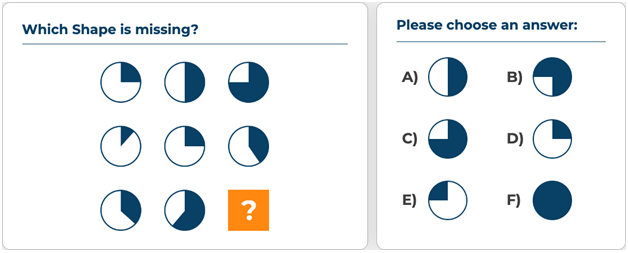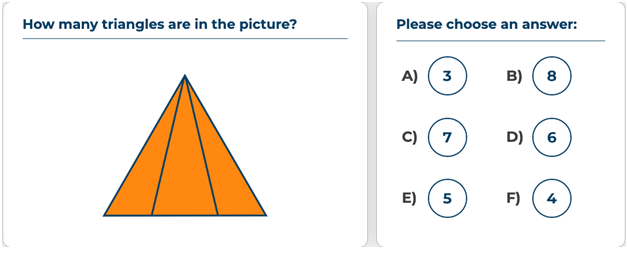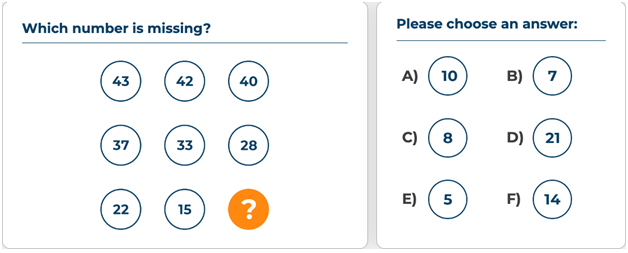Diving Deep into IQ Test Questions - An Enlightening Journey

In the vast ocean of cognitive evaluations, IQ test questions emerge as an intriguing phenomenon. They're not mere exercises in fact-recollection, but reflective assessments of an individual's capacity to think logically, solve problems, and understand complex concepts. In this comprehensive exploration, optimized for "IQ test questions", we are setting sail into the intricate world of these cognitive measures, their diverse types, and effective strategies for navigating them.
While reading and understanding about IQ test questions certainly provides a valuable foundation, there's no substitute for first-hand experience. So, why not put your newfound knowledge to the test?
Try out an online IQ test today >>. It's an excellent opportunity to apply your logical reasoning, visual-spatial understanding, and problem-solving skills in a practical scenario. Plus, you'll gain a personal insight into this fascinating field of cognitive measurement.
Unveiling the Mysteries of IQ Test Questions
IQ test questions, in essence, are intellectual barometers measuring the cognitive aptitudes of an individual. These tests typically include various question types – logical reasoning, visual understanding, pattern recognition, and mathematical abilities, to name a few. Usually delivered in a timed, multiple-choice format, the IQ test is a mental challenge unlike any other.
Categorizing the Myriad Types of IQ Test Questions
- Logical Reasoning: These questions are exercises in deductive and inductive problem-solving. For instance, you might have to recognize patterns or sequences in sets of figures or digits.

- Visual-Spatial Understanding: This type of IQ test questions hones in on the ability to mentally manipulate and visualize patterns or shapes. You may have to find the odd one out in a series of images or predict what comes next in a visual sequence.
- Verbal Comprehension: These questions test language understanding and verbal reasoning, such as understanding analogies or interpreting written texts.
- Mathematical Problems: These are designed to evaluate numerical reasoning ability and could include solving math puzzles or recognizing patterns within a series of numbers.
Deciphering IQ Test Questions: Top Strategies
Mastering IQ test questions calls for sharp observation skills, critical thinking, and mental nimbleness. Here are a few tactics to consider:
- Practice Makes Perfect: The more exposure you have to IQ test questions, the more adept you become at solving them. Regular practice enhances your speed and precision.
- Embrace Logic Over Facts: Keep in mind, these tests measure your reasoning skills, not your knowledge. Use your intuition and logical thinking to approach each question.
- Stay Cool, Stay Focused: IQ tests can be mentally demanding and time-constrained. Keep your calm, focus, and pace yourself accordingly.
In a nutshell, IQ test questions are like keys that unlock the mind's mysteries. With a solid understanding of their structure, purpose, and the ways to tackle them, you can approach this intellectual challenge with poise and confidence. By consistently practicing, thinking logically, and maintaining your cool, you are well equipped to handle these cerebral hurdles.
As we continue to dissect the "IQ test questions", it becomes evident how this cognitive tool offers an insightful look into our intellectual abilities and untapped potential. Here's to our ongoing quest to fathom the depths of human intellect!
10 sample IQ test questions
The below sample IQ test questions cover a variety of categories typically found in IQ tests, including verbal comprehension, mathematical logic, spatial reasoning, and pattern recognition.
- Verbal Comprehension: Which word is the odd one out?
- Printer, Binder, Writer, Coder
- Answer: Coder (all others refer to items used in an office).
- Mathematical Logic: What number comes next in the sequence? 2, 4, 8, 16, __?
- Answer: 32 (each number is doubling the previous one).
- Spatial Reasoning: Which of the following 3D shapes can be made by folding the 2D pattern?
- (Various images would be provided, one of which matches the 3D shape).
- Pattern Recognition: Find the next shape in the pattern.
- (A series of shapes are shown, such as a square followed by a circle, repeated. The answer would be the next shape in the sequence).
- Logical Reasoning: If all Roses are Flowers, and some Flowers are Red, then are all Roses Red?
- Answer: No (while all Roses are Flowers, only some Flowers are Red, so not all Roses have to be Red).
- Mathematical Problem-Solving: If three apples cost $6, how much would twelve apples cost?
- Answer: $24 (each apple costs $2, so twelve apples would cost $24).
- Analogies: Bird is to Fly as Fish is to __?
- Answer: Swim (Birds fly, and Fish swim).
- Verbal Reasoning: A novel is to a bookshelf, as a car is to __?
- Answer: Garage (the bookshelf is where you store a novel; a garage is where you store a car).
- Visual Puzzles: Which of the five options completes the puzzle?
- (An image with a missing piece is provided, and five options to complete the image are given).
- Classification: Which of the following does not belong?
- Dog, Cow, Dolphin, Rabbit
- Answer: Dolphin (all others are land animals).
Are you eager to test your skills? A great place to start is the article about Best IQ Test >>. It's free, easy to use, and great for beginners or those who've done an IQ test before.
In this article, you can find different types of IQ tests and get instant feedback. Don't wait any longer. Dive in and learn more about your thinking abilities. Take that first step in your self-discovery journey today!
Simplifying the Complexities of IQ Test Questions
What are IQ test questions designed to measure?
IQ test questions aim to measure cognitive abilities, not factual knowledge. They assess one's capacity for logical thinking, problem-solving, visual-spatial understanding, verbal comprehension, and mathematical reasoning.
Are all IQ tests the same?
Not exactly. While most IQ tests assess similar cognitive abilities, the exact questions, format, and scoring can vary. Some tests may focus more on certain areas, like visual-spatial skills or verbal comprehension.
Can practicing improve my performance on IQ test questions?
Absolutely. Regular practice can enhance familiarity with question types and improve your speed and accuracy. It's not about memorizing answers but understanding the logical reasoning behind them.
Is there a specific strategy to follow while answering IQ test questions?
The primary approach is to think logically, not factually. Remember, IQ tests measure your ability to reason and solve problems. It's also essential to stay calm under the timed conditions and pace your progress through the test.
Are IQ test scores definitive indicators of intelligence?
While IQ tests can provide a useful measure of cognitive abilities, they are not the sole indicators of intelligence. Intelligence is a multifaceted construct and can include aspects such as emotional intelligence, creativity, and practical intelligence, which standard IQ tests might not capture.
Can someone prepare for an IQ test?
Yes, you can prepare by familiarizing yourself with the types of questions that appear on the test. Practice tests are available online, and these can give you a feel for the kind of logical reasoning and problem-solving you'll need to do.
As we continue our exploration of "IQ test questions," we must remember that while they offer an insightful glimpse into cognitive abilities, they are but one dimension of the wide spectrum of human intelligence. The journey to understanding the vast expanse of the human intellect continues.
This article was written in cooperation with Adcore
Jerusalem Post Store
`; document.getElementById("linkPremium").innerHTML = cont; var divWithLink = document.getElementById("premium-link"); if (divWithLink !== null && divWithLink !== 'undefined') { divWithLink.style.border = "solid 1px #cb0f3e"; divWithLink.style.textAlign = "center"; divWithLink.style.marginBottom = "15px"; divWithLink.style.marginTop = "15px"; divWithLink.style.width = "100%"; divWithLink.style.backgroundColor = "#122952"; divWithLink.style.color = "#ffffff"; divWithLink.style.lineHeight = "1.5"; } } (function (v, i) { });


